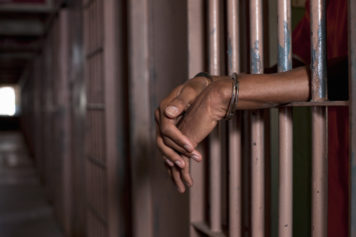
The report by the Economic Policy Institute examining the effects of parental incarceration on children’s cognitive and behavioral development in school found that the “discriminatory” jailing of Black parents often leads to lowered educational performance in Black children, as well as physical and mental health challenges.
The report, authored by researchers Leila Morsy and Richard Rothstein, indicated that nearly one in 10 African-American students has an incarcerated parent. One in four currently has or previously had a parent behind bars. Moreover, Black children are six times more likely than their white peers to see their parent(s) go to jail.
According to Morsy and Rothstein’s research, it’s these students in particular who are nearly 33 percent more likely to develop speech and/or language problems, 48 percent more likely to have attention deficit hyperactivity disorder (ADHD), 23 percent more likely to suffer from developmental delays and 43 percent more likely to suffer from behavior issues, compared to students who don’t have incarcerated parents.
In addition, the study showed that it’s more common for children with incarcerated parents to drop out of school. This was especially true for boys aged 11 to 14, who were 25 percent more likely to quit school and 55 percent more likely to drop out because they had been locked up themselves.
Boys with incarcerated fathers also completed fewer years of school than boys whose parent was not in jail, according to the report. These preteen boys also were at risk of developing different forms of PTSD, anxiety disorders, asthma, migraines and a host of other health issues.
The researchers noted that all these statistics hold true, independent of social factors such as race, IQ, home quality, socioeconomic status and mother’s education.
“One of the very interesting things about the sources in this report, because they are heavily from epidemiology studies, sociological studies, they’re very carefully controlled for other factors,” Rothstein said. “So, the differences in experiencing these conditions … can’t be attributed to either low income or other disadvantages that these children have.”
In their report, the authors went on to say they hoped their research would help educators and policy makers see that repairing the criminal justice system and making sweeping prison reforms are the keys to narrowing the racial achievement gap.
“We conclude that our criminal justice system makes an important contribution to the racial achievement gap,” they wrote. “Educators have paid too little heed to this criminal justice crisis. Criminal justice reform should be a policy priority for educators who are committed to improving the achievement of African-American children.”
Their research highlighted the alarmingly disproportionate rate at which Black men are jailed compared to white men, noting that Black men are incarcerated at six times the rate white men are. Moreover, one in three Black men will be locked up at some point in their lifetime.
The study also noted that Black men are much more likely to be imprisoned on drug charges even though Black and white men use drugs at about the same rate.
To begin improving Black student outcomes, Morsy and Rothstein suggested that educators work with criminal justice reformers to eliminate disparities between minimum sentences for possession of crack cocaine vs. powder cocaine, do away with mandatory minimum prison sentences for minor drug offenses and nonviolent crimes, and boost funding for more social, educational and employment programs for offenders re-entering society.


